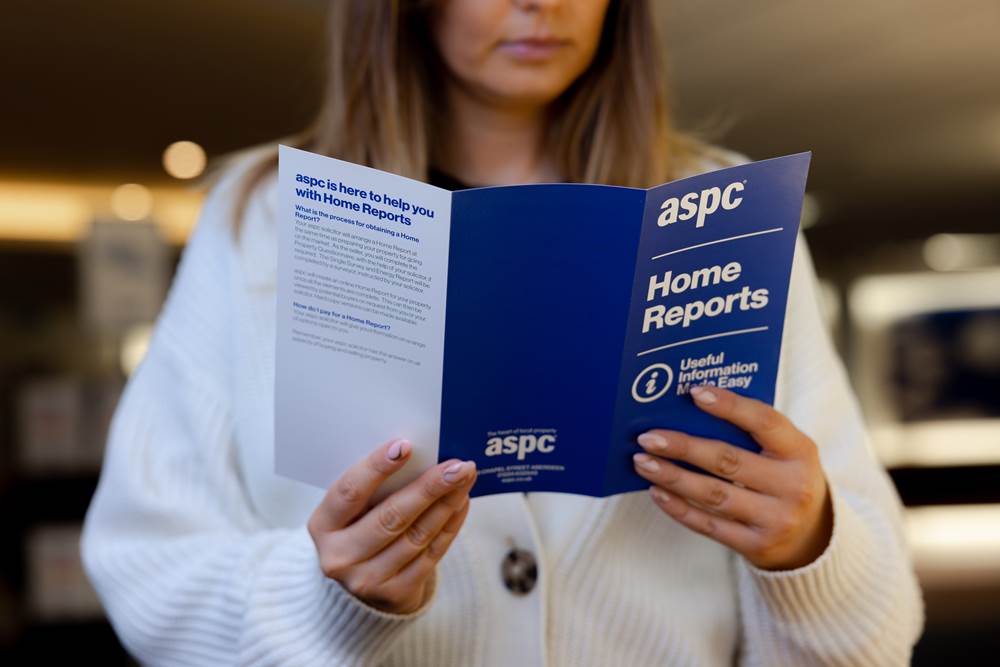
Home Reports – what you need to know
Since 2008, homes for sale in Scotland are required to be marketed with a Home Report. This consists of three documents:
Single survey
This contains an assessment by a chartered surveyor of the condition of the home and any repairs that may need to be carried out, a valuation (how much the property is worth) and an accessibility audit.
Energy Report
This contains an assessment by a surveyor of the energy efficiency of the home and its environment impact. It also recommends ways to improve its energy efficiency. It is presented as an Energy Performance Certificate.
Property Questionnaire
This is completed by the seller of the home. It contains additional information about the home such as Council Tax banding, factoring fees and details of any alternations, specialist works or guarantees.
Why were Home Reports introduced?
A Home Report provides information about the condition and value of a property before offers are made and expenses are incurred by the purchaser. It also provides the seller with the opportunity to address problems should they choose, early in the process before going on the market.
The information contained within the Home Report is of assistance to prospective buyers – forexample, highlighting its energy efficiency – and helps them to make an informed decision on theproperty best suited to their needs.
Some Questions Answered
Who pays for the Home report?
The seller is normally responsible for the cost of the Home Report.
How current are Home Reports when a property is put on the market?
Documents should be no more than 12 weeks old when a property is put on the market. If you take your home off the market temporarily, the time off-market can be no longer than 4 weeks for using the same report.
How quickly must a seller or their agent comply with a request for a Home Report from a prospective buyer?
The person responsible for marketing a property must provide a copy of any or all of the documents within 9 calendar days of the initial request.
How long is a Home Report valid?
There is no legislation which imposes a validity period for any of the Home Report documents.
Generally speaking, it is commonplace for a Home Report refresh to be requested by a purchaser and their professional advisors if the age of the report exceeds 12 weeks.
What happens if the survey identifies a problem with my home?
Sellers have various choices:
- Decide to do nothing and market the home in its present condition.
- Fix the problem.
- Obtain information on the cost or process for fixing the problem and make it available to the buyer.
Do I need a Home Report if I sell my home privately?
Under Part 3 of the Housing (Scotland) Act 2006, the person responsible for marketing the property must provide a Home Report to potential purchasers. In the case of a private sale, the responsible person is the seller themselves.
Do all properties require a Home Report?
There are some exceptions. Please refer to the list shown.
Exceptions
If you are selling a home, you will usually need a Home Report. However, there are some exceptions.
New Housing
Homes sold ‘off-plan’ to first purchaser or to first occupier.
Newly converted premises
New conversions not previously used in their converted state.
Right to Buy Homes
As the sale of a home to a sitting tenant under a Right to Buy Scheme does not involve marketing, a Home Report is not required.
Seasonal and holiday accommodation
Where a property is marketed with a planning or other restriction only permitting use as holidayaccommodation and not as a permanent residence.
Portfolio of residential properties
A home which is to be sold along with one or more other homes, where it is clear from the marketing that they are not to be sold as separate units.
‘Mixed sales’
Applies to homes sold with one or more non-residential properties.
Dual use of a dwelling house
Applies where a property is used for both residential and commercial purposes.
Unsafe properties
Properties marketed as unsuitable for occupation in their present condition.
Properties to be demolished
Properties marketed with the necessary consents for demolition and re-development.
Additional reading:

